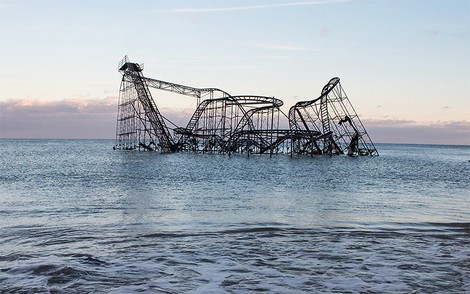Your podcast discovery platform
Curious minds select the most fascinating podcasts from around the world. Discover hand-piqd audio recommendations on your favorite topics.

piqer for: Climate and Environment Global finds
Andrea is a writer and researcher based out of Chicago. Andrea has a Bachelor's degree in environmental science from The Ohio State University and a Master's in Environmental Planning and Management at National Taiwan University, where she specialized in climate adaptation and urbanization. She writes for TaiwaneseAmerican.org, and sends out a biweekly newsletter which includes articles on politics, environment, identity, and intersections of race, class, and gender (http://eepurl.com/bPv-F5).
The Case for Climate Reparations
This article follows three families in the US in the midst of climate-related disasters. From wildfires in California, to Hurricane Harvey in Texas, and Hurricane Maria in Puerto Rico, people are now seeing the damages of climate change in a visceral way. Estimates of the cost of these disasters are astronomical, and are only going to climb as time goes on. Which begs the question: "Who should pay the costs of the death and destruction caused by human-driven global warming?" Although climate accountability is not new, it is increasingly relevant as it becomes clear that those most vulnerable to the effects of climate change have done little to cause them.
"Climate change reparations" is the shorthand for this claim—reparations meaning, basically, "a rectification of past and ongoing harms." A plainer word would be justice. But justice is elusive, difficult to calculate, and often impossible to enforce. The notion of climate reparations, also referred to as "climate restitution," has proved radioactive within international climate change talks, as richer nations resist acknowledging the responsibilities they may hold.
But any kind of action in service of climate reparations is difficult to imagine, let alone enact. From time lag between cause and effect, geographical issues, and the sheer immensity of the problem, how to even begin reparations is a dizzying question. But nevertheless, many are trying to tie together the evidence against fossil fuel barons who have knowingly amassed great fortunes at the cost of stable climate. New research can connect individual disasters to anthropomorphic climate change, and lawsuits are being used to leverage against fossil fuel companies.
This article elegantly moves from narratives of those at the frontlines of disaster to discussions of environmental ethics and the state of climate litigation. Well worth the read on how climate change is a problem bigger than most human systems.
Stay up to date – with a newsletter from your channel on Climate and Environment.
